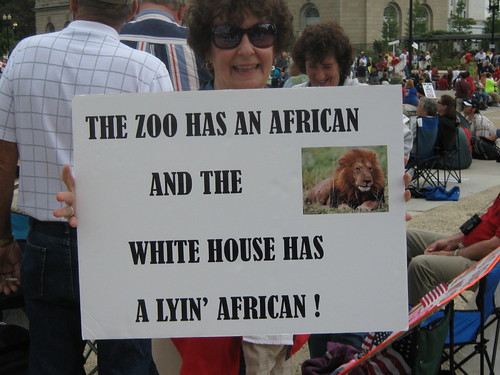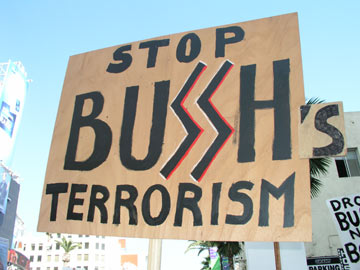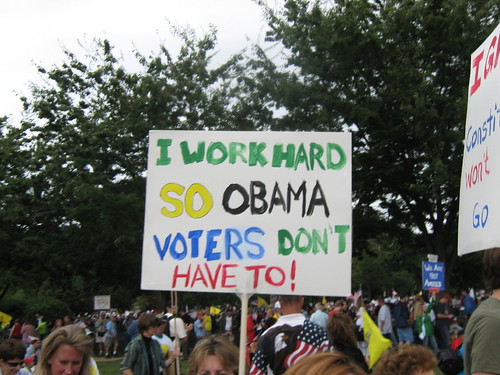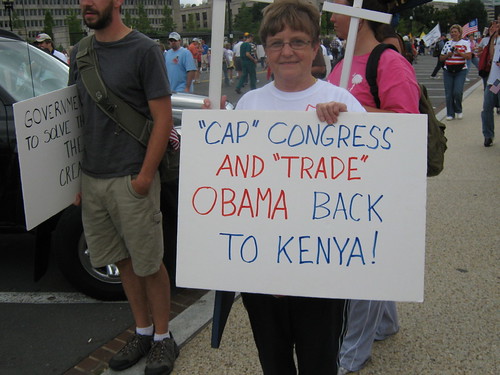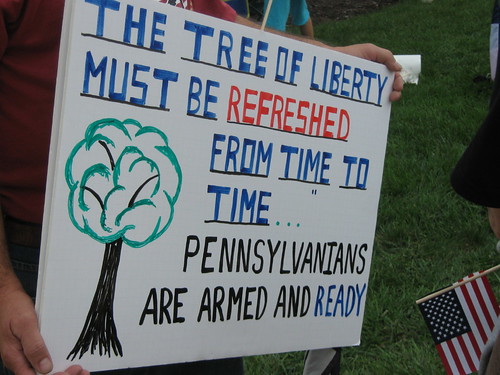 While I was in Chicago for Mike and Erika's wedding over the weekend (great fun!), I had the opportunity to watch the last 15 minutes of Hannity on Fox News. The topic of discussion was a story that I hadn't been exposed to yet, but has apparently blown up on the blogosphere and on Fox News (it was being discussed on Greta Van Susteren immediately after Hannity signed off). In a nutshell, a video was uncovered of some New Jersey public school students in the classroom led by their teacher in the singing of a song praising Barack Obama. The singing apparently took place in February as part of the class's Black History Month celebration. The discussion on Hannity revolved mainly around what a horrifying act of 'indoctrination' this is. Tucker Carlson, whose numerous embarrassing failures as a prime-time cable talk host have apparently led him to abandon his dream of being the next George Will in favor of being the next Michelle Malkin, compared it to something the Khmer Rouge would do, prompting this priceless takedown from Gawker's Foster Kamer (be extra-sure to click through to his piece if you don't know who the Khmer Rouge were). Never one to pass up the opportunity to leap on a passing bandwagon, RNC head Michael Steele has sent out a fundraising email comparing the occasion to both Stalin's Russia and Kim Jong-Il's North Korea.
While I was in Chicago for Mike and Erika's wedding over the weekend (great fun!), I had the opportunity to watch the last 15 minutes of Hannity on Fox News. The topic of discussion was a story that I hadn't been exposed to yet, but has apparently blown up on the blogosphere and on Fox News (it was being discussed on Greta Van Susteren immediately after Hannity signed off). In a nutshell, a video was uncovered of some New Jersey public school students in the classroom led by their teacher in the singing of a song praising Barack Obama. The singing apparently took place in February as part of the class's Black History Month celebration. The discussion on Hannity revolved mainly around what a horrifying act of 'indoctrination' this is. Tucker Carlson, whose numerous embarrassing failures as a prime-time cable talk host have apparently led him to abandon his dream of being the next George Will in favor of being the next Michelle Malkin, compared it to something the Khmer Rouge would do, prompting this priceless takedown from Gawker's Foster Kamer (be extra-sure to click through to his piece if you don't know who the Khmer Rouge were). Never one to pass up the opportunity to leap on a passing bandwagon, RNC head Michael Steele has sent out a fundraising email comparing the occasion to both Stalin's Russia and Kim Jong-Il's North Korea.Three things come to mind here. First, it's important to consider the context. If the initial reports are to be believed, this was an activity meant to celebrate Black History Month, not a daily ritual that had to be completed before the kids could get their afternoon box of chocolate milk. As the first black president, Obama is a not-inconsiderable figure in the annals of black history. Yes, Obama is 'controversial' in the sense that there is political opposition to his legislative agenda. However, during Black History Month, the children doubtlessly learned glowing facts about the greatness of Martin Luther King, Jr, who was widely considered in his day to be a Communist subversive bent on destroying American civil society, and engendered more controversy than Barack Obama ever will, the efforts of Hannity, Steele, and Carlson notwithstanding. It's no secret that American primary and secondary education tends to present a watered-down and colorless version of history that actively seeks to avoid any trace of contemporary relevance, lest someone be "offended." The fact that public school history is so boring is a big contributor, I believe, to the fact that even fairly well-educated Americans have a shamefully poor grasp of the subject.
Secondly, the actual content of the offending song bears examination. Here are the lyrics, copied directly from Fox News' addendum to their story on the matter.
You'll doubtlessly notice that there's actually very little political content in the song. Nowhere does it mention nationalized healthcare, marginally increasing the income tax on top-bracket earners, cap and trade global warming legislation, or the withdrawal of overseas troops. Instead, it lists off a bunch of vaguely defined grade-school civics pieties that could probably be cut-and-pasted into a song about any politician that's run for any office in the past twenty-five years. Taken on its merits, I can't see what there is to get offended about. Unless, of course, one were to conclude that conservatives are opposed to civic-mindedness, fairness, racial tolerance, and equitable employment policies. Which would be clearly absurd.
Mm, mmm, mm!
Barack Hussein ObamaHe said that all must lend a hand
To make this country strong again
Mmm, mmm, mm!
Barack Hussein ObamaHe said we must be fair today
Equal work means equal pay
Mmm, mmm, mm!
Barack Hussein ObamaHe said that we must take a stand
To make sure everyone gets a chance
Mmm, mmm, mm!
Barack Hussein ObamaHe said red, yellow, black or white
All are equal in his sight
Mmm, mmm, mm!
Barack Hussein ObamaYes!
Mmm, mmm, mm
Barack Hussein Obama
Finally, I think that people who are pushing this 'indoctrination' line are confused about the function and purpose of indoctrination. For that argument to be taken even remotely seriously, one would have to demonstrate a widespread and coercive effort to expose a cross-section of American youth to only one particular political viewpoint. 18 kids singing a dopey song about Barack Obama one time doesn't meet the criteria. Even if the dreaded song had a more regular and extensive presence in American schools (which I think would clearly be inappropriate), kids have a remarkable tenacity against official indoctrination. Witness the abject failure of D.A.R.E., which, despite being a near-universal presence in public schools, has been categorized as meeting the criteria for 'Does Not Work' by the U.S. Surgeon General's Office.
Let's go further and ask why, exactly, Barack Obama would want to indoctrinate a bunch of third-graders into a cult of personality. If I may call your attention to the 26th Amendment to the U.S. Constitution, you'll soon figure out that none of these kids can vote for Obama in the 2012 election. Nor will they be able to vote for whomever the Democratic nominee for President will be in 2016. Is this song really magical enough to not only instill liberal values in these children, but maintain them single-handedly for the next 11 years? Or give them the ability to hypnotize their parents into participating in a letter-writing campaign in support of Obama's legislative goals?
The kids that sang that song, like kids everywhere, are going to be exposed to a wide variety of political opinions as they grow up. George H.W. Bush was President when I was 8 years old. I remember getting a Presidential Fitness Certificate with his mimeographed signature in gym class, and then later hearing my parents bitch about him around the kitchen table. The kids in this makeshift choir will have similar experiences. In fact, depending on their parent's political inclinations, they might already have been given a T-shirt such as this:

Or this:
 In the end, this 'controversy' actually does, in a sense, wind up being about indoctrination. However, it's not about schools brainwashing kids, it's about parents who believe that the principles of democracy are little more than a permission slip allowing them to drill their social and political views to their children unchanged and unchallenged. That's why the school administrators are now reportedly being deluged with death threats. Which do you think is the real threat to freedom?
In the end, this 'controversy' actually does, in a sense, wind up being about indoctrination. However, it's not about schools brainwashing kids, it's about parents who believe that the principles of democracy are little more than a permission slip allowing them to drill their social and political views to their children unchanged and unchallenged. That's why the school administrators are now reportedly being deluged with death threats. Which do you think is the real threat to freedom?


